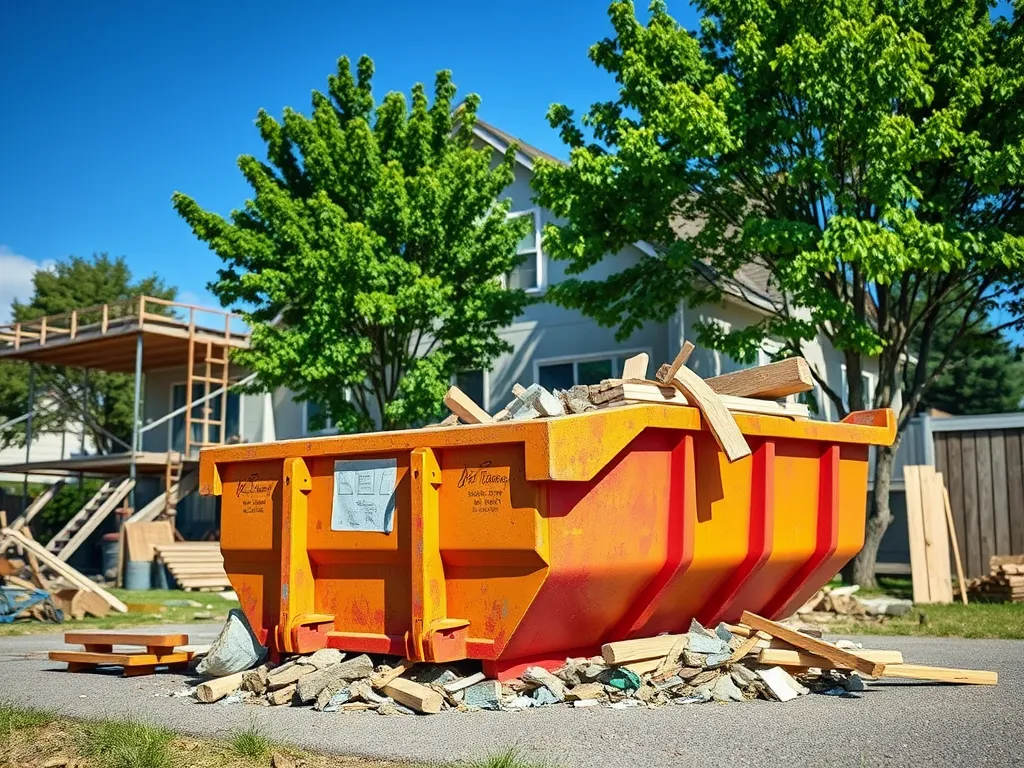Essential Guide to Dumpster Rental for Home Renovation

Dumpster Rental for Home Renovation: A Complete Guide
When embarking on a home renovation project, one crucial aspect to consider is waste management. Dumpster rental for home renovation offers an efficient solution to manage debris and unwanted materials, ensuring a smooth and organized renovation process.
Without proper waste disposal, your home can quickly become cluttered with construction debris, old furniture, and various other materials. Dumpster rental for home renovation provides a convenient way to tackle this problem, allowing homeowners to focus on their project rather than how to dispose of the waste.
Moreover, using a dumpster rental service eliminates the need for multiple trips to the landfill or recycling center, saving you time and effort. It creates a safe and tidy work environment, minimizing hazards and enhancing productivity during your renovation.
From planning kitchen remodels to bathroom upgrades, dumpster rental for home renovation can cater to projects of any size. Understanding the specifics of dumpster rental services helps homeowners make informed decisions, ensuring their renovation is carried out seamlessly.
This article delves into essential aspects of dumpster rental for home renovation, including choosing the right dumpster size, cost factors involved, scheduling your rental, local regulations, and eco-friendly disposal options.
Choosing the Right Dumpster Size
Understanding the various dumpster sizes available is vital in selecting the right option for your home renovation project. Most dumpster rental companies offer a range of sizes, typically from 10 to 40 cubic yards, accommodating different types of projects.
To estimate the waste volume for your project, consider the scope of work you are undertaking. If you're remodeling a small bathroom or updating a single room, a smaller dumpster may suffice. However, large-scale renovations, such as a full home remodel, will likely require a more substantial dumpster to handle the increased waste volume.
Common dumpster sizes include: 10-yard dumpsters for small cleanouts or single-room renovations, 20-yard dumpsters for medium projects like kitchen remodels, 30-yard dumpsters for large home renovations and big cleanouts, and 40-yard dumpsters for commercial projects or extensive residential renovations. Understanding these sizes will ensure you choose the right one for your needs.
For a smoother project experience, consider how you can Simplify Your Home Renovation with a Residential Dumpster Rental.
When selecting the right size, always err on the side of caution. It’s better to have a slightly larger dumpster than to find yourself dealing with excess waste that cannot be accommodated. Consult with your dumpster rental provider for personalized recommendations based on your renovation plans.
Cost Factors in Dumpster Rental
The cost of dumpster rental for home renovation can vary significantly based on several factors. Understanding pricing structures is crucial to ensuring you stay within budget. Most companies base their prices on the dumpster size, rental period, and type of waste being disposed of.
Be sure to read the fine print and watch out for hidden fees that can inflate your final bill. Common hidden charges can include delivery and pickup fees, exceeding weight limits, and costs for extra days or rental extensions. Always clarify these potential fees before signing the contract.
Comparing the costs of different dumpster sizes is also essential. While larger dumpsters typically have higher base prices, they may prove more cost-effective for big renovations by reducing the need for multiple smaller rentals. Determine the ideal size for your project to make informed financial decisions.
Tips for budgeting your renovation's waste disposal include calculating the expected volume of waste, comparing various rental companies’ prices, and considering recycling or eco-friendly options, which might also reduce overall costs in disposal fees.
Scheduling Your Dumpster Rental
Timing is everything when it comes to renovation projects. To ensure efficiency, schedule your dumpster rental anticipating the timeline of your renovation work. Having the dumpster on-site before the project begins can streamline the process, allowing for immediate disposal of waste as work progresses.
When scheduling delivery and pickup, communicate with your contractor or laborers about their timeline. This will help you determine the ideal rental period, avoiding unnecessary delays or extended fees.
Unexpected delays in renovations can occur, so plan for these situations when scheduling your dumpster. It’s wise to include a buffer period at the end of your rental timespan to accommodate any unforeseen challenges.
Best practices for keeping your site organized during rental include placing the dumpster in a convenient location, ensuring it's easily accessible for the laborers, and encouraging workers to use the dumpster consistently to maintain a tidy workspace.
Local Regulations and Permits
Navigating local regulations regarding dumpster placement and waste disposal is a crucial aspect of the rental process. Some cities require permits for placing dumpsters on public property or streets, which may involve application fees and specific guidelines.
Understanding your local waste disposal regulations will help you stay compliant and avoid potential fines. Research or consult your dumpster rental provider for information on local rules regarding dumpster use, such as weight limits and disposal restrictions.
To avoid fines and penalties, ensure you’re familiar with the terms set forth by your local government and the rental company. Confirm whether permits are necessary for your project and secure them before your dumpster rental begins.
Identify a reliable point of contact for local regulations. This could be your rental company, a local government office, or a dedicated waste management department who can provide guidance and support through the process.
Eco-friendly Waste Disposal Options
One significant aspect of home renovations is ensuring that waste is disposed of responsibly. Exploring recycling options for renovation waste will help minimize your environmental impact and promote sustainable practices within your project.
Choose a green dumpster rental service that emphasizes eco-friendly disposal methods. Many companies are dedicated to recycling as much renovation waste as possible, including woods, metals, and concrete, which helps reduce landfill waste.
Tips for reducing waste during home renovations include re-purposing materials, donating usable items, and planning meticulously to prevent excess waste generation. Incorporating these strategies into your project will contribute to a more sustainable renovation process.
The benefits of eco-friendly disposal practices extend beyond environmental conservation. They can also enhance your property's value, improve community aesthetics, and create a sense of responsibility within homeowners, ultimately making your renovation project more impactful.
